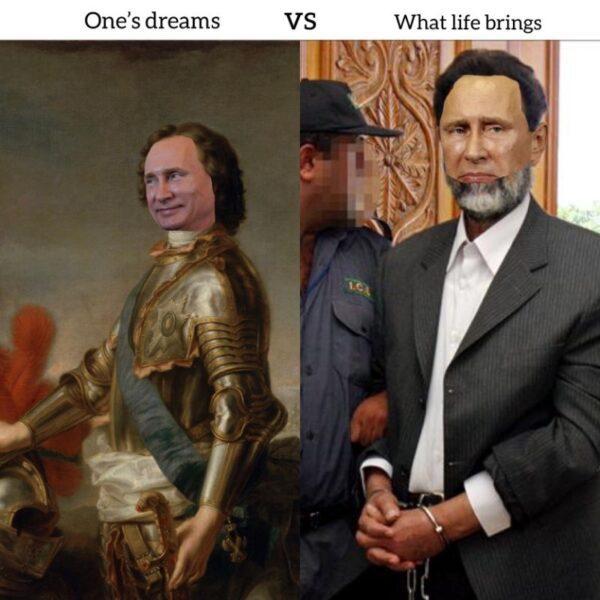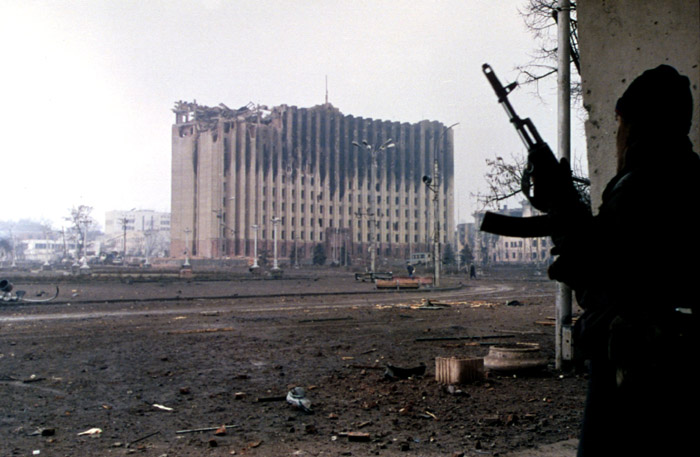
Putin and his disciples have set about to accomplish their life mission of restoring Russia as a great world power. Unlike most modern nations, they still gauge national greatness not by economic success and human progress, but by land area controlled. They make no secret of aspiring for nothing less than the Soviet Union’s historic borders. Half a year into conquering, however, reality has proven this ambition chimerical. The Soviet Union is bygone irrevocably.
Down to earth, we can recognize three possible outcomes with regard to Russia’s borders after the war:
- No borders at all; Russia vanishes as a state together will all other states following nuclear annihilation.
- Same borders; Russia loses the war and returns to its pre-2014 borders (add Crimea and Donbas at most), most likely with a new hard-line leader from the same regime at its helm.
- Disintegration; The Russian Federation breaks apart into numerous sovereign countries.
It is this third scenario I want to discuss here, which I personally believe is the most probable one because I think of it as a long-overdue collapse of the world’s last empire…
First of all, what I mean by empire
Empire is a loosely defined word that people use with various meanings. I’m not about to argue that there are right and wrong definitions—I abide by clarity and not correctness. So for my present purpose, I define an empire as:
…an extensive and rigidly centralized dominion ruling by force over an ethnically and culturally diverse population.
This definition encompasses most examples of historical political units we commonly call empires—ancient ones (such as the Persian or Roman) and more recent ones (such as the Spanish or British). But it excludes others…
Some past political entities we often see referred to as empires but are excluded by my definition are trading empires such as the Phoenician, (pre-Alexandrian) Greek, and Hanseatic Empires. These domains were neither centralized nor ethnically heterogeneous. They were associations of unicultural free cities that we conventionally call empires by virtue of their collective economic power.
Another such historical example is Imperial China. This is a case of a state that was vast and centralized but ethnically homogenous. Hence it is excluded from my definition of an empire.
Lastly and most importantly, my definition excludes the present-day American Empire. The USA is undoubtedly the single most powerful country in history, but it doesn’t fit my definition. Being a federation of autonomous, democratic states, it is far from rigidly centralized. And although its people come from diverse racial backgrounds, they largely share the same culture and national identity. This nation’s inception was of course an instance of European imperialism, but nowadays, for good or bad, native populations are all but fully assimilated.
The USA is dubbed an empire primarily in relation to its foreign policy. But in this field again, I wouldn’t call it that under my definition. America does not rule by force over foreign lands; it exerts influence through diplomatic and economic means. It maintains hundreds of overseas military bases, but these are established by contract instead of conquest. Whereas colonies of former European empires were little more than big mines, plantations, or slave bazaars, the so-called American colonies are generally the most prosperous countries in their respective regions. The US, too, has taken its shot at military imperialism in cases like Iraq and Afghanistan, but all such attempts failed and were instances of resources-wasting rather than power-gaining.
The reason I’ve gone through this section is to justify my previous characterization of Russia as the world’s last empire; an empire of the historic-relic kind that has resisted collapsing for too long.
The modern Russian Empire
Contemporary Russia traces its roots to the Tsarist Empire, which expanded concurrently with and in a similar fashion to the rest of the European colonial empires. Whilst Western European nations took to the oceans in search of new lands to seize and exploit, Russia, lacking convenient access to the sea and naval capabilities, resorted to the appropriation of the cold and barren lands of northern Eurasia. This geographic infelicity is where the Russian nation’s chronic resentment against the West was rooted.
Just like its seafaring colonial counterparts, Russia ruled by the sword over the natives of its new territories. In an intermediate historical period between old, multicultural realms and new, uniform Nation-States, unlike ancient empires, these colonial empires were chauvinistic at their core.
Revolution then modified the name of the Russian Empire to Soviet Union, but it changed little with regard to its nationalistic scope. No sooner than Lenin died, the smenovekhi had returned, Communism’s international ideals had faded, and Russia was again the same old Russians’ Russia; now governed by a new, proletarian, anti-Western Russian elite in place of the previous, now-liquidated, aristocratic, Western-minded Russian elite.
A lot changed with respect to Russia’s relations with its Western imperialistic counterparts; instead of the opportunistic friends or foes they previously were amid their hegemonic games, now they all became demonic, intrinsic enemies. A little changed with respect to the lives of everyday Russians; they were removed from farms and forced into factories.
But nothing changed (if not for the worse) with respect to the treatment of ethnic minorities; Russians occupied the top administrative positions in all of the (nominally autonomous) Soviet Republics, Russian settlers took over the most important urban centers and most fertile lands empire-wide, and minorities from Poles to Chinese and Cossacks to Jews were mass-deported to Siberia at best or mass-executed at worst. The most atrocious minority-persecution campaign carried out by the Soviet Russians was the Holodomor, targeting the Russians’ most brotherly peoples.
Meanwhile, from the 1950s onwards, the Western colonial empires gradually fell apart. In some cases, like the British one, the collapse came about relatively peacefully. In others, like the French or the Portuguese, it came at a cost of seas of blood and unspeakable suffering. One way or another, by the mid-1970s colonial empires were no more; with the exception of Russia.
The Soviet Empire was a good few decades late to finally collapse in 1991. But the decolonization was incomplete. Fourteen new countries gained their freedom following the USSR’s dissolution. The smoothness with which this process happened was quite an unprecedented, admirable historic miracle.
But these new countries were merely lucky to have been nominally designated as Republics by the Russian-Soviet authorities. Fortuitous political events that took place generations ago were the only reason why they were allowed independence while millions of non-Russians still trapped inside the ensuing Russian Federation weren’t. And whereas millions of ethnic Russians (2nd-to-4th-generation descendants of land usurpers) left out of Russia were generally fortunate to not be exiled or persecuted like many of their European counterparts in Africa, ancient non-Russian cultures in Russia remained subjects of a foreign empire. The Chechens famously tried to grasp the opportunity and alter this mishap, but their hopes (together with their homes) were readily quashed by artillery.
According to the latest official Russian census in 2010, 22.3% of the country’s population consists of ethnic minorities and 12 oblasts have a non-Russian majority. These statistics likely understate Russia’s ethnic diversity; both because the central government may tweak them to present Russia as more Russian and because subjects may misreport their ethnicity for fear of discrimination. Anyhow, at least 30 million people of 192 recognized ethnic minorities live today under the sway of the nationalistic, modern Russian Empire.

How could the Russian dissolution play out
Today’s Russia goes through a very similar situation to what preceded the fall of the Soviet Union. It fights—and loses—a disastrous war abroad. It experiences a deep, long economic crisis that the latest sanctions only aggravate. It returns to Soviet levels of isolation from the rest of the world. And it is governed by a brutal, senile, and corrupt elite that exacerbates these issues.
A great bulk of its ethnic Russian population, who have bought into the systematically cultivated nationalistic frenzy and have so far suffered only a modest share of the crisis’s impact, may need some more time to grow disillusioned. But the ethnic minorities, who are the ones providing the cannon fodder despite not having an inherent propensity to Russian nationalism, are likely getting angry.
The most probable ethnic group to initiate secession efforts are, of course, the Chechens. Kadyrov may have sold himself out and brag about manning the Russian army’s suicidal frontlines, but his balderdash is unlikely to resonate with ordinary Chechens whose children now perish in Ukraine after their parents perished in the Caucasus. The harrowing memories of the Chechen Wars are still fresh.

The Chechen battalion of Dzhokhar Dudayev has been fighting against the Russians in Ukraine since 2014 already. It doesn’t take a soothsayer to guess that other Chechens back home, perhaps in coordination with neighboring Caucasian peoples, are waiting for the war in Ukraine to drag the Russian military down to the nadir of its decline, preparing to uprise.
Away from the Caucasus, we then think of the Turkic peoples’ heartland in the Volga-Ural region. The republics of Tatarstan, Bashkortostan, and Chuvashia still have non-Russian majorities, while all surrounding republics and oblasts maintain substantial non-Russian minorities. What is especially interesting about this region is that it accounts for a very significant part of Russia’s natural resources and industrial production, with nearly a quarter of the country’s oil and gas being extracted there.
Many locals may not be particularly content about their homeland’s treasures being funneled to economically worthless Moscow to finance the irrelevant-to-them, nationalistic-imperialist agenda of the Kremlin. As the central regime weakens, therefore, voices advocating for independence and wealth expropriation could grow louder throughout that region.
Then we have a whole host of other regions with large indigenous ethnic groups that became minorities only during the 20th-century Soviet programs of population-reshuffling and Russification, like the Turko-Mongolic republics of Southern Siberia and Yakutia. A striking example of such a case is the Republic of Komi, which, from a 1926 92.2%-vs-6.6% Komi-to-Russians population proportion, has reached a corresponding contemporary rate of 23.7%-vs-65.1%. Inspired and encouraged by other minorities throughout the empire, they, too, may eventually go through a process of ethnic rejuvenation and seek greater self-determination.
Last but not least, we have to also think about the solidly ethnic-Russian provinces of the federation. Just like Australia, Canada, or New England were predominantly inhabited by Brits but chose to leave the British Empire for economic reasons, so may do several Russian subjects of the Russian Empire.
The Far East, to begin with… It makes little economic sense for them to remain politically tethered to a faraway capital, connected to it by a sole railway of 6,000 miles. A characteristic—though of minor consequence—example of this senselessness that I personally observed while in Vladivostok is how a majority of Japanese, right-wheeled cars drive on the right side of the road. As the Kremlin’s sway wanes, these Russians may well figure out that they’d be better off loosening ties with Moscow and pursuing closer integration with East Asia. The remarkable, recent protests in Khabarovsk may be an early sign of this predilection.
Then we think of the Khanty-Mansi Autonomous Okrug and the adjoining provinces of Western Siberia. This area is of particular interest because it holds the lion’s share of Russia’s oil-and-gas reserves; the backbone of the country’s economy. The locals, Russians or otherwise, could well conclude that developing their neglected regions is a smarter use for their petrodollars than sending them Moscow-ways to fund wars, propaganda, assassinations, oligarchy, and whatnot.
Lastly, Kaliningrad, Karelia, Pskov, and even Saint Petersburg itself could also be inclined to abandon Moscow in favor of a lucrative, closer integration with the EU.
